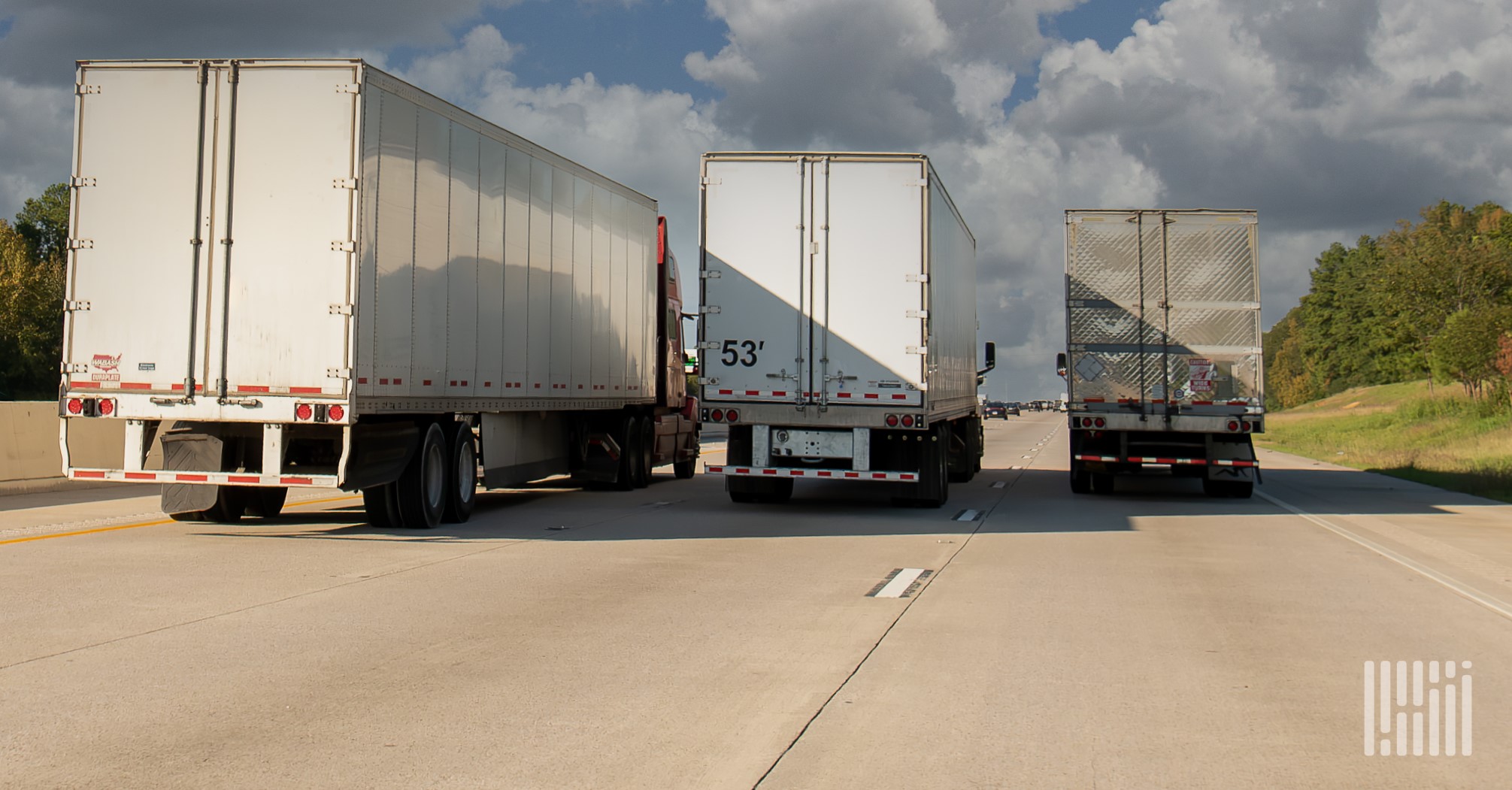Choosing the right less than truckload (LTL) load board is critical for LTL freight brokers and carriers to efficiently find loads and trucks.
Not using the right LTL truck load board can lead to missed opportunities, wasted time and effort posting loads and bidding without results, higher costs due to lack of rate analysis, and overall inefficiencies that cut into margins.
Quality LTL boards provide extensive load listings, reliable tracking tools, and fast load posting so users can quickly connect. This guide will highlight some of the best LTL load board options for those in the transportation sector to choose from.
Quicklook: Top LTL load boards for trucking
- Best for load matching: Truckstop
- Best for sorting functionality: uShip
- Best for freight intelligence: 123Loadboard – Find Loads
- Best for flexible and instant booking: Uber Freight – Find Loads
- Best for mobile app: Trucker Path – Find Loads
What is the difference between LTL and FTL loads?
LTL and FTL (full truck load) differ primarily in how the truck’s capacity is utilized. In LTL shipping, multiple shippers share space in the same truck, with each shipment typically being smaller and only taking up a portion of the available space. This makes LTL more cost-effective for shippers with smaller loads, though it usually means longer delivery times since the truck makes multiple stops.
FTL shipping means one shipper uses the entire truck’s capacity, regardless of whether they completely fill it. This option provides faster, direct delivery since the truck goes straight from pickup to a single destination. FTL is typically more expensive but offers better security and less risk of damage since the freight isn’t handled multiple times for different deliveries.
The importance of LTL load boards
LTL load boards serve an incredibly valuable purpose in efficiently connecting shippers and brokers who have freight in need of transport with carriers that have open partial cargo capacity.
The automation, matching algorithms, and shipment details provided through quality LTL boards give brokers access to a broader network for securing reliable hauling coverage on a perpetually shifting roster of loads.
For carriers, leveraging the load visibility and constantly updated postings on boards provides abundant shipping contract opportunities to profitably keep trucks filled to lower deadhead miles by booking backhauls. since deadheading directly impacts their bottom line by creating expenses without generating income.
In an industry with tight margins and capacity crunches, the aggregation, organization, and smart matching enabled by LTL boards fuels frictionless transactions keeping freight fluid across supply chains.
Best LTL freight boards
If you’re wondering what is the best LTL load board, you can’t go wrong with any of the options on this list.
Truckstop
Truckstop has over 10,000 verified LTL carriers integrated into their platform, simplifying the search process for freight brokers and shippers to quickly find truck capacity.
Truckstop uses complex algorithms to recommend the safest, most profitable LTL loads to haul for each truck. It matches loads precisely to a vehicle’s size and weight limits. This prevents overloading while optimizing freight revenue. Its modeling technology is uniquely advanced for custom LTL assignment.
Best for: Load matching
Features:
- Reputation of excellence
- Will help you break into the industry
- Large network
- Carrier verification
Benefits:
- Search by load type or truck type (cargo van, straight trucks or box trucks, etc.)
- Shipment tracking and status updates
- Fast payment
- Market insights with Pro plan
Disadvantages: More expensive than some other load boards
Pricing: Starts at $42 per user per month for carriers and $109 per user per month for freight brokers
uShip
uShip’s standout LTL load board feature is their LTL freight sorting functionality that uses predictive analytics to showcase the highest probability LTL truck loads matching a carrier’s parameters.
uShip uses smart matching algorithms to suggest the best-fit loads for each carrier. These personalized recommendations match shipment details to carrier fleet capabilities. It simplifies finding ideal loads, increases relevant options, and optimizes carrier earnings.
Best for: Sorting functionality
Features:
- New listings every 30 seconds
- Nationwide listings
- Competitive bidding
- Photo uploads
- Vehicle shipment details
Benefits:
- Can use detailed search criteria to find the carrier that best meets your LTL trucking needs
- Easy access to high quantities of shippers
- Compare rates
- Large network of trucking owner-operators and carriers
- Access driver profiles
Disadvantages:
- Quotes not guaranteed
- Need to handle all communication with the carrier
Pricing: Free until transportation is secured
123Loadboard

123Loadboard provides detailed analytical breakdowns of LTL load attributes like density, average rate values, market pricing fluctuations and historical trends across lanes and regions.
Carriers gain data-backed insight into profitable LTL shipment selection while brokers identify competitive rate benchmarking for pricing bids and negotiations. This level of rich, transparent LTL data fuels informed decision-making.
Best for: Freight intelligence
Special features:
- Credit scores for brokers
- Rate checks
- Quick payments
- 10-day free trial with each plan
Benefits:
- Cost insights
- Free to post LTL freight loads
- Large network
Disadvantages:
- Doesn’t have a hot shot filter
- Complaints about the PC version of the app
Pricing:
- Free app with limited usage
- Standard: $35 per month
- Premium: $45 per month
- Premium Plus: $55 per month
Uber Freight

Uber Freight’s platform enables real-time LTL freight booking with dynamic pricing. Carriers can instantly secure LTL loads without long bid delays, while shippers gain access to a broader capacity network to meet urgent transportation needs.
This flexible, quick-booking functionality powered by Uber Freight’s algorithms ensures rapid load assignments optimized to market rates. By bridging shipping demand and cargo capacity on-demand, Uber Freight adds value on both ends for hassle-free LTL execution.
Best for: Flexible and instant booking
Features:
- No negotiations
- Select and pick up available loads right away
Benefits:
- Facility reviews
- Fair market pricing
- Instant booking
- Ease of use
- Greater earning potential
Disadvantages:
- Higher fees
- Little information provided by app
- Reduces potential clients
Pricing:
- Free
- Uber fees built into app pricing
Trucker Path

Trucker Path is one of the fastest-growing LTL freight boards available, with the most popular mobile app. Quickly sort by load types to filter down to LTL freight and get driving. Trucker Path is a one-stop shop for LTL trucking with extra features and industry insights for users.
Best for: Mobile app
Features:
- Intuitive mobile app and desktop site
- Round trip and capacity ratio data
- Live load updates
Benefits:
- Comprehensive industry info
- Large carrier network
- Easy to use
Disadvantages:
- Many features locked with the essential plan
- Not all truck stop reviews are reliable
Pricing:
- Essential: $199.99 per year
- Preferred: $399.99 per year
- Ultimate: $899.99 per year
A closer look at the different types of LTL boards
LTL freight load boards come in different types. These include large freight sites, small niche sites, carrier portals, and more. Each targets different needs. But all types connect shippers to carriers with available cargo space for partial truckloads. The core job of matching loads to trucks is the same across the various LTL board models.
Below are the main types of LTL (less-than-truckload) load boards:
- General freight marketplaces: Platforms like Truckstop that match all types of truckload freight, including robust LTL-specific options.
- Niche LTL networks: Focused entirely on LTL with advanced optimization tools tailored for partial truckloads.
- Logistics management suites: Broader transportation management systems that incorporate some embedded LTL freight load board functionalities alongside other multimodal capabilities.
- Crowdsourced models: Websites enabling one-off manual listing and assignment of LTL shipments instead of ongoing matchmaking algorithms. uShip is an example.
- Carrier-direct connections: Large LTL carriers host portals directly showcasing their own first-party freight capacity for digital assignment.
Find the best LTL load board for your needs
Finding the right less than truckload load board can make a significant difference in your trucking business’s efficiency and profit.
By choosing a platform that matches your needs, you can secure reliable LTL freight loads, reduce empty miles, and streamline operations. Explore these top picks to take your freight-matching process to the next level and stay ahead in a competitive market.
FAQ
Free LTL freight load boards can be worth it for a trucking company on a tight budget, but they often lack robust features, have limited freight volume, and minimal verification of loads or carriers. More established paid boards offer enhanced tools and higher quality shipments that may provide greater value.
Yes, shippers and manufacturers commonly leverage load boards to post listings of their freight needing transport to access broader carrier networks and competitive pricing for securing truck capacity. Posting loads on boards allows automation of booking trucks versus manual driver assignments.
Local loads can be found by using freight load board search filters for origin ZIP codes near your current location and setting a max deadline radius, then sorting by recency and other preferences to discover quick regional opportunities fitting your truck. Checking local loads should be part of a daily search regimen.
LTL freight can be highly profitable when you optimize routes, maintain consistent customers, and manage operator costs effectively. Successful LTL carriers often earn profit margins between 10-20%. However, this requires careful planning and management since LTL involves more complex logistics and handling than FTL shipping.



